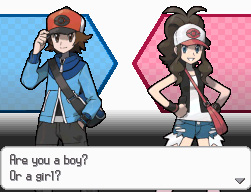How Gamers Use Video Games to Explore Gender Identity
Games offer a safe place to “try on” other genders and see if they resonate.
This piece was featured in Psychology Today.

This article was co-written by Mo Deslandes, Psy.D., a postdoctoral therapist and “cozy gamer” who supports LGBTQ growth through video gaming.
“Are you a boy or a girl?”
Kris frowned at the screen, unsure how to respond.
Was Kris a boy or a girl? Did either category feel right?
Kris hadn’t expected an existential crisis when grabbing Pokémon off the shelf that morning. But the game’s introductory question had raised a question that Kris had been pondering recently. The game was simply asking what hair and clothing to assign to the protagonist. But what answer felt right? What was Kris’s gender?
Kris is not alone in this journey. Many gamers uncover key elements of their identities while playing video games. Because video games require gamers to either play as an existing character or design their own, they very often spend time playing as other genders or making conscious decisions about gender.
Video Games and Gender
Most video games have a male protagonist, forcing every player to assume the role of a man for many hours. Most boys and men never notice this discrepancy; male protagonists are taken for granted.
However, some gamers find it challenging to play as a man, for reasons they might not understand. For them, games with female protagonists somehow feel better. In-game characters calling the player a “her” delights them.
A recent therapy client named Alex* noticed this while playing Horizon Zero Dawn. Destroying mechanical velociraptors as Aloy, the series’ female protagonist, was exhilarating, but Alex couldn’t explain why.
Alex explained that it was more than the usual fun of overcoming a fast-paced challenge. Aloy’s long red hair, her clothing, even the way that she stood felt liberating.
Eventually, Alex discovered why playing as Aloy felt so affirming. Alex admired Aloy’s courage and skill but also felt deeply connected to the character’s gender. Alex had always been called a man but wasn’t sure why this felt uncomfortable. Exploring this was Alex’s first step toward understanding herself as a trans woman.
Experimentation
Assuming the role of another can be illuminating. Gamers in particular can learn about themselves by paying attention to what aspects of the characters they connect with.
Do I cringe when my character bosses others around? Do I feel happy when caring for fictional children? Perhaps I value kindness and would enjoy being a parent. If I am happiest when my character rescues others, should I consider a career as a firefighter or EMT?
Some take advantage of this power to explore parts of themselves in a safe environment. If someone assigned male at birth decides to wear a dress to school, their parents and other students might respond with questions or violence.** If that same person decided to click on a dress in Animal Crossing, no one would know.
THE BASICS
One writer explained, “In real life, I couldn’t play around with how I presented. I knew kids who got beat up for daring to paint their nails. I wasn’t interested (nor brave) enough to confront that reality. In place of doing so, I banished those thoughts into the deepest confines of my mind. Playing as a girl in a game was a small thing, but it let me assert some control over how I presented myself—in a way that eight-year-old me could never do in person.”
Some games have begun to be more inclusive by removing gender labels entirely. Early Pokémon games explicitly asked for one’s gender to determine which character model to use. Recent games in the series instead ask players to “choose a look” or "choose an appearance."


This provides gamers who are questioning their gender the opportunity to avoid selecting a label of which they are still uncertain. It is also more inclusive of non-binary people who fit neither the “boy” nor “girl” categories. These systems aren’t perfect—the eight pictures still imply a binary choice, with boys on the left and girls on the right—but it’s a step forward.
The Sims 4, a life simulation game, recently gave players the ability to add scars to their characters’ chests. These specific scars indicate that the character has undergone masculinizing chest reconstruction, or “top surgery,” which removes one's breasts. The same update added binders—clothing which compress one’s chest to reduce mental discomfort with having visible breasts. These inclusive features were widely praised by the trans community.
Mo has even “prescribed” playing as different genders in video games to clients who are unsure of their gender. Reflecting on how it feels when playing as different genders is often revealing. Clients who find the experience of playing as a woman more affirming than playing as a man might spend time afterward thinking about their own gender. Why did moving a virtual woman around feel so good? Why didn’t controlling a male character provide the same happiness or comfort?
Worried parents should note that playing video games cannot make people transgender. They can only help that person understand who they always were.
Online Community
Video games also invite players to a broad range of online communities. Many online groups for queer video game enthusiasts provide informal support networks. These are inclusive and safe places to anonymously discuss gender without fear of “outing” oneself or sharing one’s identity with others who might not be supportive.
People who have never met any openly queer people can go to these online spaces to describe their emotions and get support from others. This virtual support can last as long as they wish, regardless of whether they decide to share their identity with family or friends. Sharing your internal life with others is crucial for your mental health.
Additionally, these communities enable people to discover labels they were unaware of. Several of my clients vividly remember learning in online spaces that non-binary people exist. This was revelatory for them—the way that they felt inside had a name and a history and a culture to connect with.
Limitations and Safety Concerns
Even though research and anecdotal evidence show that video games can be used in several positive ways, there are limitations.
Large parts of the gaming community argue that games should only be fun and should not contain politics.
Asserting that it is possible for games to be apolitical is, in my view, ridiculous, like it is for any art form. However, this has made many online communities unsafe places to express one’s identity. When identity is brought up, it is frequently rejected by others in the forum. Gamers commonly disguise themselves online to avoid harassment. (I discussed this in greater detail here.)
Parents should help their children learn how to be safe online. This includes (1) explaining the dangers of providing one’s full name or contact information, (2) encouraging them to share with parents when they feel uncomfortable or frightened, and (3) never agreeing to meet with people met online without consulting their parents first. (A guide with more information for parents can be found here.)
Further, even though online communities are an important source of support, they are incomplete ways to connect with others. Existing in physical space with supportive people is critical to feeling supported and loved. This is especially true when others in the room share important parts of our identity.
Despite these challenges, video games and associated communities are invaluable resources to help people explore gender and connect with others.
*Clients discussed in this article are combinations of several real-world cases to preserve anonymity.
**If you or a loved one is experiencing distress due to harassment or questions about gender, please seek support from a licensed professional with experience working with LGBTQ clients. If you are having thoughts of suicide, please call your local suicide hotline. In the United States, the number is 988. You are not alone.
